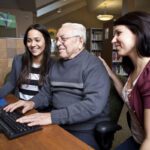The rate at which people move and resettle around the world is unprecedented. Mobility and resettlement is now greatly assisted by the use of inexpensive internet communication technologies (ICTs) for a wide variety of functions: to communicate locally and across territories, for localised information seeking, geo-locational mapping and for forging new social connections in host countries and cities. This article is based on a qualitative study of newly arrived migrants and mobile people from non English speaking backgrounds (NESB) to the city of Brisbane, Australia and investigates how the internet is used to assist the initial period of settling into the city. As increasing amounts of essential information is placed online, the study asks how people from NESB communities manage to negotiate the types of information they require during the early stages of resettlement, given varying levels of access to ICTs, digital and language literacy. The study finds that the internet is widely used for specific location information seeking (such as accommodation and job-seeking), but this is often supplemented with other non-mediated sources of information. The study identified implications for social policy in regard to the resourcing and access of information. While findings are specific to the study location, it is feasible that the patterns of internet use for resettlement have relevance in a broader context.
The home environment and Asian immigrant children’s early literacy skills
Objective.The current study examines how aspects of the home literacy environment were related to Asian immigrant children’s early literacy skills.Design.One hundred and thirty-nine Asian immigrant

